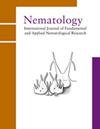Metabolites and chemical agents in the plant roots: an overview of their use in plant-parasitic nematode management
IF 1.2
4区 生物学
Q2 ZOOLOGY
引用次数: 2
Abstract
Plant-parasitic nematodes are devastating phytopathogens that cause substantial economic losses in the agricultural sector. There are numerous management measures available to reduce the threat posed by plant-parasitic nematodes. One of the most effective management strategies is the use of synthetic chemical nematicides. However, many of these chemicals negatively impact the environment and health of non-target organisms, so there is great urgency for finding new environmentally safe and sustainable approaches for managing plant-parasitic nematodes. Plant roots release numerous metabolites that possess defensive properties; thus, it is imperative to understand the root-regulated interactions among plants and nematodes that form the basis for managing plant-parasitic nematodes. The present review focuses on the root metabolites and chemical agents that serve as attractants, repellents, stimulators, or inhibitors for nematodes. They influence plant resistance by modifying plant physiology to resist nematodes and can also inhibit nematode growth and development by secreting antinematode chemicals. The ultimate goal of this review is to focus mainly on the current state of knowledge on the interaction between plant roots and the potential of these compounds in management of plant-parasitic nematodes.植物根系中的代谢物和化学制剂:它们在植物寄生线虫管理中的应用综述
植物寄生线虫是毁灭性的植物病原体,对农业部门造成重大经济损失。有许多管理措施可用于减少植物寄生线虫造成的威胁。最有效的管理策略之一是使用合成化学杀线虫剂。然而,许多这些化学物质对环境和非目标生物的健康产生负面影响,因此迫切需要寻找新的环境安全和可持续的方法来管理植物寄生线虫。植物根系释放大量具有防御特性的代谢物;因此,必须了解植物与线虫之间的根调控相互作用,这是管理植物寄生线虫的基础。目前综述的重点是根代谢物和化学制剂作为引诱剂,驱避剂,刺激剂,或抑制线虫。它们通过改变植物的生理机能来抵抗线虫,并通过分泌抗线虫的化学物质来抑制线虫的生长和发育。这篇综述的最终目的是主要关注植物根系之间相互作用的知识现状以及这些化合物在植物寄生线虫管理中的潜力。
本文章由计算机程序翻译,如有差异,请以英文原文为准。
求助全文
约1分钟内获得全文
求助全文
来源期刊

Nematology
生物-动物学
CiteScore
2.60
自引率
33.30%
发文量
67
审稿时长
3 months
期刊介绍:
Nematology is an international journal for the publication of all aspects of nematological research (with the exception of vertebrate parasitology), from molecular biology to field studies. Papers on nematode parasites of arthropods, and on soil free-living nematodes, and on interactions of these and other organisms, are particularly welcome. Research on fresh water and marine nematodes is also considered when the observations are of more general interest.
Nematology publishes full research papers, short communications, Forum articles (which permit an author to express a view on current or fundamental subjects), perspectives on nematology, and reviews of books and other media.
 求助内容:
求助内容: 应助结果提醒方式:
应助结果提醒方式:


